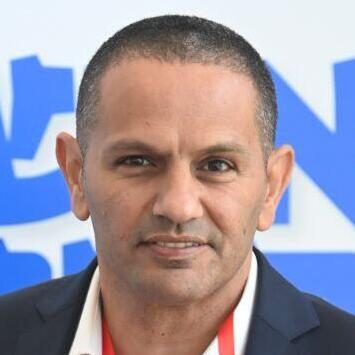Getting your Trinity Audio player ready...
Many Israelis were forced to rush from their beds to the bomb shelter in the dead of night for the fourth time in a week. Although the ballistic missile launched from Yemen Wednesday morning was successfully intercepted, the Houthis continue to establish themselves as a central threat following the cease-fire in the north and the dismantling of much of Hamas' capabilities in the south.
The combination of missiles and drones in this sector has created a reality where sirens sound every other day and even at night.
Footage of Houthi missile
(Video: Tzvika Greenwald)
2 View gallery


Mossad Director David Barnea, IDF Chief of Staff Lt. Gen. Herzi Halevi
(Photo: AFP, Ido Erez, IDF Spokesperson's Unit)
As anticipated in Israel, the third Israeli Air Force strike in Yemen has only increased the Houthis' appetite to continue launching attacks. The Houthis even added a new drone infiltration route to the one they previously used — via the Mediterranean, crossing the Sinai Peninsula to Gaza and then to the western Negev.
Meanwhile, Israel is still debating whether to strike Iran, as proposed by Mossad Director David Barnea, or Yemen, as suggested by the IDF. Barnea presented his proposal to the Security Cabinet, arguing that such a move could deter the Houthis and pressure Tehran to rein in their Yemeni branch.
However, a senior IDF official countered, claiming that Iran's influence over the Houthis is not comparable to its hold over Hezbollah, describing the Houthis as "a kind of independent and unruly child." According to the official, such a strike would not achieve the goal of deterring the Houthis and could instead reopen a direct front with Iran.
Barnea believes Iran is currently deterred by Israel, especially after the latest strike and even more so on the cusp of U.S. President-elect Donald Trump's return to the White House. Defense Minister Israel Katz addressed the issue twice within 12 hours, reiterating that Israel would target the Houthis without mentioning Iran.
2 View gallery


Damages resulting from Houthi missile launches
(Photo: Mor Steinberg, Yuval Chen, Amir Levy/Getty)
"We won’t tolerate the Houthis continuing to fire on the State of Israel," Katz said. "We’ll deal with the Houthi leaders in Sanaa and across Yemen." Indeed, targeting the organization's leadership is a potential option, aligned with a policy where indiscriminate fire from Yemen toward Israel may be met with a similarly broad response.
The challenges in this sector are well-known, with intelligence gaps being the foremost issue — not because the IDF’s intelligence and Mossad have neglected the threat but because they’ve faced far more urgent missions in Lebanon, Syria, Iran and Gaza.
Get the Ynetnews app on your smartphone: Google Play: https://bit.ly/4eJ37pE | Apple App Store: https://bit.ly/3ZL7iNv
The second challenge is the distance, which makes strikes complex and costly. On the other hand, these operations serve as live training for potential strikes in Iran.
Throughout the war, Prime Minister Benjamin Netanyahu has almost always sided with the Mossad chief's position over the military's when disagreements arose. These decisions have proven effective, as seen in operations like the pager operation and Hassan Nasrallah’s elimination. It’s possible Netanyahu will align with Barnea’s approach again. In the meantime, nighttime alarms courtesy of Yemen are likely to continue.






